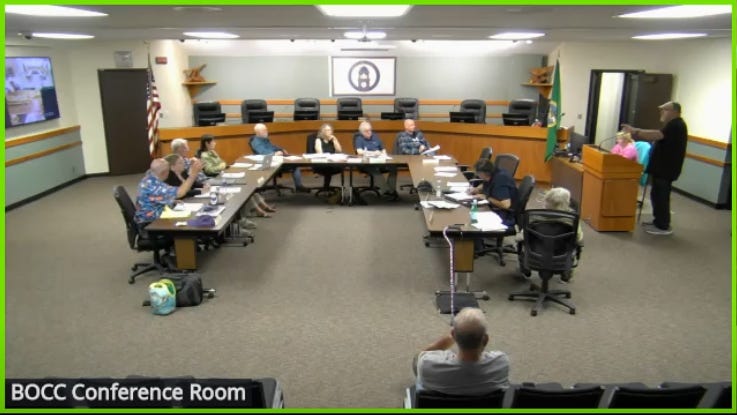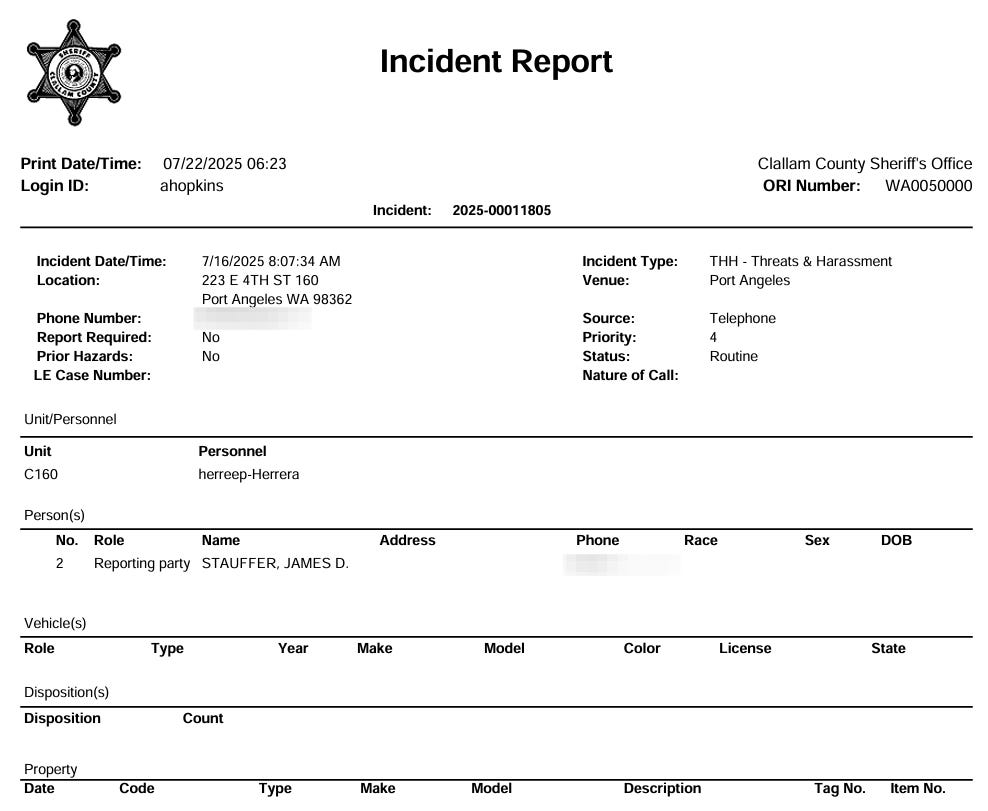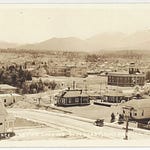What started as a hopeful exercise in citizen-led reform has unraveled into dysfunction, censorship, and calls for security. The Clallam County Charter Review Commission promised transparency and public engagement—but instead wasted months on personal agendas, ignored public input, and tried to silence dissent. Now, after being called a name during public comment, one commissioner wants law enforcement at meetings. With deputies already stretched thin, many are asking: Is this about safety—or just shielding officials from accountability?
During the initial meetings of the Clallam County Charter Review Commission (CRC) in January, the atmosphere was hopeful. Commissioners struck a cooperative tone, claiming they were simply serving as conduits for people to structure their local government. They vowed to represent the public’s will and uphold the county’s home rule charter, which states, “The Charter is a county constitution designed to give the control of county affairs to the people of the county.”
There was early talk of a public survey. Commissioners spoke of civic engagement and seemed genuinely interested in transparency. Attendance was strong. Public comments were respectful. The mood was optimistic.
Then, everything changed.
The first issue the CRC spent significant time on—more than six hours—was a nonstarter brought up by exactly one member of the public: Sequim School Board member Patrice Johnston, who wanted to restrict the reporting of publicly available information. This issue became a pet project for Chairwoman Susan Fisch and Commissioner Jim Stoffer. They dragged the full commission through the mud of an obvious First Amendment violation, despite repeated warnings that restricting the rights of commissioners to speak and report information was unconstitutional.
County staff were tasked, resources were spent, and the Rules and Bylaws Committee was reactivated—all for a proposal that never stood a legal chance. It was ultimately voted down. The waste of time was bad enough, but it also sent a loud message: this CRC wasn’t about the people. It was about personal grievances and petty vendettas.
The tone-deafness continued at the CRC’s first public town hall. Fisch and Stoffer actively prohibited fellow commissioners from answering questions or engaging with the audience. The meeting was ended an hour early. Stoffer later told the Sequim Gazette that such engagement would have been illegal—a claim that was completely false and never corrected. Attendance at future town halls plummeted.
Responding to questions would have been equivalent to the Commission taking action, which it could not legally do at that meeting, he [Commissioner Jim Stoffer] said. — Sequim Gazette
When the long-promised public survey finally arrived—months late—it contained only seven questions, many of which were not priorities for either the commissioners or the public. Even so, the survey results provided clarity: overwhelming support for prohibiting county commissioners from sitting on NGO boards, and strong support for returning to district-only voting.
And what did the CRC do with that input?
They shelved the popular ideas and prioritized one of the most unpopular: the creation of a “Water Steward” position. The public had spoken—and the CRC ignored it. Once again, process was used to silence dissent, not to uplift public voice.
By midyear, decorum inside CRC meetings had all but collapsed. Members routinely disregarded their own bylaws to quash dissent. One commissioner called another an “asshole”—twice. The public was told to sit quietly, like spectators in a courtroom—“We’re doing work in front of you,” Stoffer lectured the gallery.
Another push was made—led by Fisch, Stoffer, and Commissioner Chris Noble—to limit public comment: what could be said, and even who could be addressed by name. The CRC wasn’t commanding respect. It was demanding obedience.
Things came to a head at the July 14 meeting during public comment. Longtime meeting attendee Eric Fehrmann stepped to the podium to speak:
Eric Fehrmann: “The person’s name is Jim Stoffer. That’s who goes after people at a church and tries to get them kicked out of a volunteer role.”
Commissioner Stoffer: “Chair?” (interrupting)
Fehrmann: “I’m not supposed to mention any names, is that right?” (referring to a proposed rule by Stoffer and Fisch to not allow public commenters to address commissioners individually)
Fehrmann (continuing): “We went through that before. I’m saying it, and I’ve said it.”
Commissioner Stoffer: “Chair?” (again trying to interrupt)
Fehrmann: “I’m speaking right now, so you better tell him to shut up. It’s my turn at this microphone and I’ve got three minutes, and I’m gonna speak, and then he can say whatever he wants to. Don’t interrupt me again. You have run this meeting like—anyway. You say that you want to hear from the people. The people come up here, they give you 74 percent of them say, ‘No, they don’t want a water steward’—bam—you shove it through. You get another 74 percent, or whatever, that says they want to have meetings with the commissioners where they can talk to us and they come up here and say, ‘No, we can’t afford it. We can’t afford to pay the staff.’”

Fehrmann (continuing): “I tell you what, I’m going to volunteer right now. I will learn what this staff position is and I’ll take care of it for nothing. How’s that? If I need more people, I’ll get them. Because we get enough people in this county that can come up here and run it, where they don’t come out of their pocket, so there’s no excuse. You guys are a joke. There’s a few of you on here with some common sense, but you,” (pointing to Stoffer), “are just a rotten S.O.B. and I’m not gonna back off so now go ahead and spew some more crap.”
Chairwoman Fisch: “Mr. Fehrmann, that’s enough.”
As Fehrmann walked away from the podium, he added:
Fehrmann: “I’m not the one who started swearing up here, it was one of your members,” referring to the two times Commissioner Paul Pickett had called another commissioner an asshole.
Watch the public comment by clicking here and advancing to timestamp 3:43:15.
Commissioner Stoffer later took to Nextdoor to announce that he had filed a complaint with the Clallam County Sheriff’s Office.
Here’s what the official dispatch log says (lightly edited for spelling and readability):
Narrative, 07/16/2025 08:51:54: “I spoke with Jim and he was wondering what could be done during their meetings to prevent unruly citizens and outbursts. They feel the citizens who attend their meetings are becoming too aggressive and they feel unsafe as council members. They asked if possibly having a deputy at the meeting or security guard would be possible.”
Narrative, 07/16/2025 08:07:37: “Caller, a Charter Review Commissioner, reported that disruptive individuals have been verbally threatening and abusive during public comment periods at Charter Review Commission meetings. Caller stated that on July 14 at approximately 8 PM... one individual, identified as Eric Furman, used offensive language, and named other individuals involved, and requested a follow-up contact by phone.”
The irony here is hard to ignore. A commission that has routinely dismissed public input and attempted to limit speech is now asking law enforcement to protect them from criticism.
Maybe it wouldn’t hurt to have someone at these meetings who’s well-versed in the Constitution—perhaps more so than some CRC members or even the retired judge who serves as chairwoman. Because calling someone a name, while impolite, is not a criminal offense.
Meanwhile, the Clallam County Sheriff’s Office is already understaffed. Deputies are stretched thin, and private security has been hired just to maintain coverage at the courthouse. In that context, requesting law enforcement to step in because a commissioner was offended during public comment raises real questions about priorities, resources, and leadership.
This is your government in action. The Charter Review Commission is well past the halfway point in its term. Instead of tackling high-priority issues or delivering meaningful reforms, much of its time has been spent managing personality conflicts, silencing dissent, and now, exploring ways to insulate itself from public frustration that it helped create.
Public comment spotlight
If you have a comment for the Charter Review Commissioners, contact them by sending an email to the Clerk of the Board at loni.gores@clallamcountywa.gov.
District 3 Commissioners,
I am writing to express my concern that, collectively, you are not voting in alignment with the desires of the citizens in District 3, who you were elected to represent.
We simply cannot afford the mandated position of "Water Resources Specialist". Our county is significantly underfunded in public safety and our county commissioners are threatening further cuts if revenue is not raised. The Clallam County Sheriff's Office employed only 0.83 officers per 1,000 residents in 2024. This compares with the Washington state-wide average of 1.35 officers per 1,000 residents. Washington State ranks LAST in the nation for officers per capita.
This public safety issue needs to be rectified before we burden the county's budget with new mandated positions.
Do you really think that we should hire a Water Resources Specialist before we hire another deputy? Please ask the citizens you represent what they think. We trust you to vote accordingly.
Kind regards,
Jacob Seegers
CRC meeting tonight
This evening, the Charter Review Commission will vote on whether to advance the controversial Water Resources Specialist position (Water Steward) to the November ballot for voters. The public is welcome to attend and provide testimony in person or online.
Monday, July 28, 5:30 PM
Commissioners’ Boardroom, Clallam County Courthouse, Port Angeles, 233 E. 4th Street, Room 160 (main entrance closed; follow signs and enter from 4th Street)
Zoom instructions available here.
PUD and Board of County Commissioners meeting today
At the joint meeting, the PUD and Board of Commissioners will discuss a range of infrastructure-related topics, including:
Regional infrastructure challenges across the county, such as power, roads, sewer, and water systems.
West End-specific needs, focusing on the unique infrastructure issues facing communities in that part of the county.
Strategies for collaboration between agencies to address infrastructure gaps and improve services.
Economic development opportunities tied to investments in public infrastructure and utilities.
Monday, July 28, 1 PM
Clallam County Courthouse, Commissioners’ Boardroom
In person and virtual attendance instructions here.














